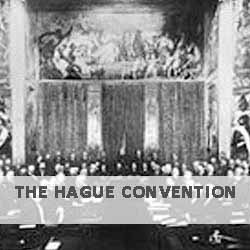The Hague Convention
What is the Hague Convention?

The Hague Convention is an International treaty between the United States and over 89 foreign countries.
The Hague Convention is a treaty between the United States and many foreign countries. As of May 2013, 89 Countries including the United States were signatories to the Hague Convention. The actual name of the convention is The Hague Convention of 25 October 1980 on the Civil Aspects of International Child Abduction. However many people refer to The Hague Convention of 25 October 1980 on the Civil Aspects of International Child Abduction as simply “The Hague Convention." It should be briefly noted however that there are many other treaty’s which have been adopted by the Hague Conference on Private International Law which deal with issues other than international child abduction and which may also be referred to as the “Hague Convention." It is therefore prudent for a parent seeking the return of child who has been abducted to use the formal name of the treaty when seeking assistance in the return of the child(ren).
In the United States, The Hague Convention, or the Hague Convention of 25 October 1980 on the Civil Aspects of International Child Abduction has been incorporated into Federal Law with the adoption of the International Child Remedies Abduction Act (42 USC 11601 et seq). Pursuant to 42 USC 11603 the provisions of the Hague Convention are enforceable in both Federal Courts and state courts. Section 42 USC 11603 provides as follows:
11USC 11603 : Judicial remedies
(a) Jurisdiction of courts
The courts of the States and the United States district courts shall have concurrent original jurisdiction of actions arising under the convention.
In Ohio, The Hague Convention and its provisions are enforceable in Ohio pursuant to Ohio Revised Code R.C. Section 3127.32. Ohio Revised Code Section 3127.32 provides that a juvenile court or other court with appropriate jurisdiction may enforce an order for the return of a child made under the Hague Convention on the Civil Aspects of International Child Abduction.
The purpose of The Hague Convention is to provide a legal process whereby a child(ren) who is/are wrongfully removed or wrongfully retained (as those terms are defined by Article 3 of the Convention) can be returned to the child’s country of habitual residence (and as that term is defined by Article 4 of the Convention). However, in considering an action for the return of a child who has been wrongfully retained or wrongfully removed (abducted), it is necessary that a parent must consider a number of factors before filing a petition for the return of a child pursuant to the provisions of The Hague Convention.
A parent considering an action for the return of a child pursuant to The Hague Convention must take into consideration a number of factors. First a parent must consider whether his/her country is a member of The Hague Convention. In order to invoke the provisions of The Hague Convention both the country where the child has been removed /or retained and the country to which the child is to be returned must be signatories ( members) to The Hague Convention. If both countries are not signatory’s to The Hague Convention ( a member) then the provisions of The Hague Convention do not apply. A list of the countries which are members of the Hague Convention can be found at the Hague Convention Web Site which is www.hcch.net.
The second factor which a parent must consider is what is the “ Habitual Residence” of the child immediately prior to the wrongful removal or wrongful retention. Generally a parent seeking the return of a child is seeking to have the child returned to that parent’s country of residence. Habitual residence is a term that is defined by Article 4 of the Hague Convention. Article 4 of the Hague Convention defines when a child is a habitual resident of a country. Article 4 of the Hague Convention states:
The Convention shall apply to any child who was habitually resident in a Contracting State immediately before any breach of custody or access rights. The Convention shall cease to apply when the child attains the age of 16 years.
Finally a parent who is seeking the return of the child who has been abducted must consider whether there has been a wrongful removal or retention under Article 3 of the Hague Convention. If a child is determined to be a habitual resident of a country then a parent seeking the return of a child to the child’s country of habitual residence must determine whether the child has been wrongfully removed or wrongfully retained. Article 3 of the Hague Convention defines a wrongful removal and a wrongful retention as follows:
Article 3: The removal or the retention of a child is to be considered wrongful where -
a) it is in breach of rights of custody attributed to a person, an institution or any other body, either jointly or alone, under the law of the State in which the child was habitually resident immediately before the removal or retention; and
b) at the time of removal or retention those rights were actually exercised, either jointly or alone, or would have been so exercised but for the removal or retention.
The rights of custody mentioned in sub-paragraph a) above, may arise in particular by operation of law or by reason of a judicial or administrative decision, or by reason of an agreement having legal effect under the law of that State.
Since 1996 when the law firm of Gary J. Gottfried Co LPA was lead counsel in the land mark case of Friedrich v Freidrich, 78 F.3d 1060( 6th Cir. 1996), the Law Firm of Gary J. Gottfried Co LPA has continued to be counsel for many families seeking the return of children pursuant to the Hague Convention.
Official Hague Convention Site Resource
If you would like to learn more about the Hague Convention and receive official updates, feel free visit their Official Site >>
Contact Us Now
"*" indicates required fields
Testimonials
Gary has fantastic response to questions. Highly recommended!
- 100% Client Recommended on Lawyers.com
Our Location

GARY J. GOTTFRIED CO. LPA
Family Law Attorneys
608 Office Parkway, Suite B
Westerville, OH 43082
Telephone (614) 297-1211
Fax (614) 297-6387
Members of The Hague Convention
This is a list of all the countries who are currently participating in the Hague Convention. Please visit the Hague Convention's official site for any updates www.hcch.net/en/states/hcch-members. This list was last updated April 25, 2018 by Archmore Business Web.
- Albania
- Andorra
- Argentina
- Armenia
- Australia
- Austria
- Azerbaijan
- Belarus
- Belgium
- Bosnia and Herzegovina
- Brazil
- Bulgaria
- Burkina Faso
- Canada
- Chile
- China, People's Republic of
- Costa Rica
- Croatia
- Cyprus
- Czech Republic
- Denmark
- Ecuador
- Egypt
- Estonia
- European Union
- Finland
- Former Yugoslav Republic of Macedonia
- France
- Georgia
- Germany
- Greece
- Hungary
- Iceland
- India
- Ireland
- Israel
- Italy
- Japan
- Jordan
- Kazakhstan
- Korea, Republic of
- Latvia
- Lithuania
- Luxembourg
- Malaysia
- Malta
- Mauritius
- Mexico
- Monaco
- Montenegro
- Morocco
- Netherlands
- New Zealand
- Norway
- Panama
- Paraguay
- Peru
- Philippines
- Poland
- Portugal
- Republic of Moldova
- Romania
- Russian Federation
- Saudi Arabia
- Serbia
- Singapore
- Slovakia
- Slovenia
- South Africa
- Spain
- Sri Lanka
- Suriname
- Sweden
- Switzerland
- Tunisia
- Turkey
- Ukraine
- United Kingdom of Great Britain and Northern Ireland
- United States of America
- Uruguay
- Venezuela
- Viet Nam
- Zambia


